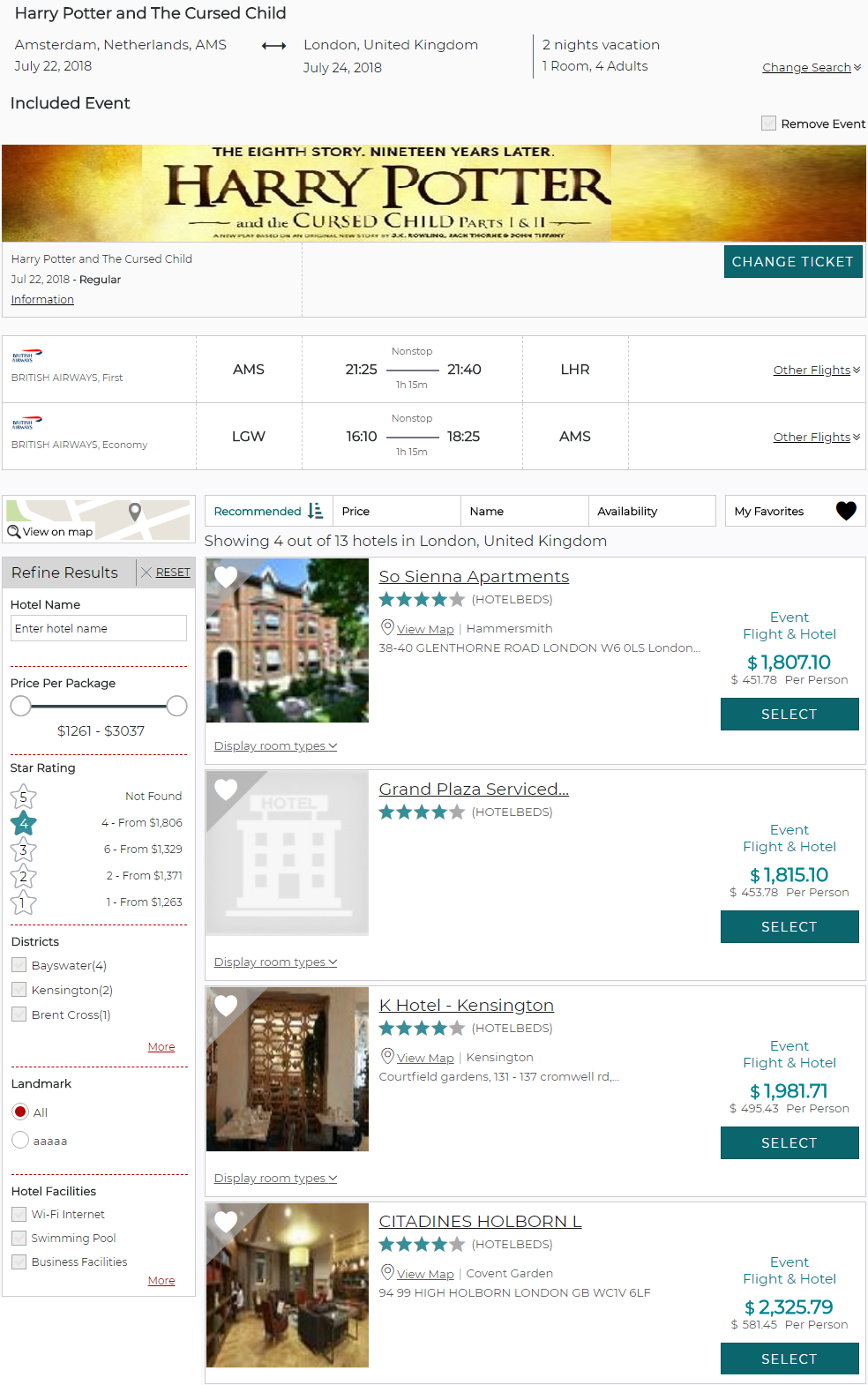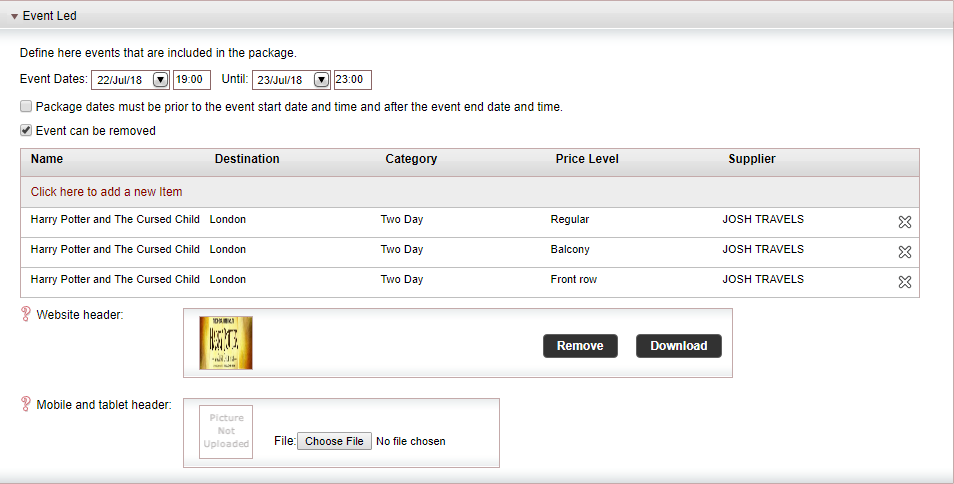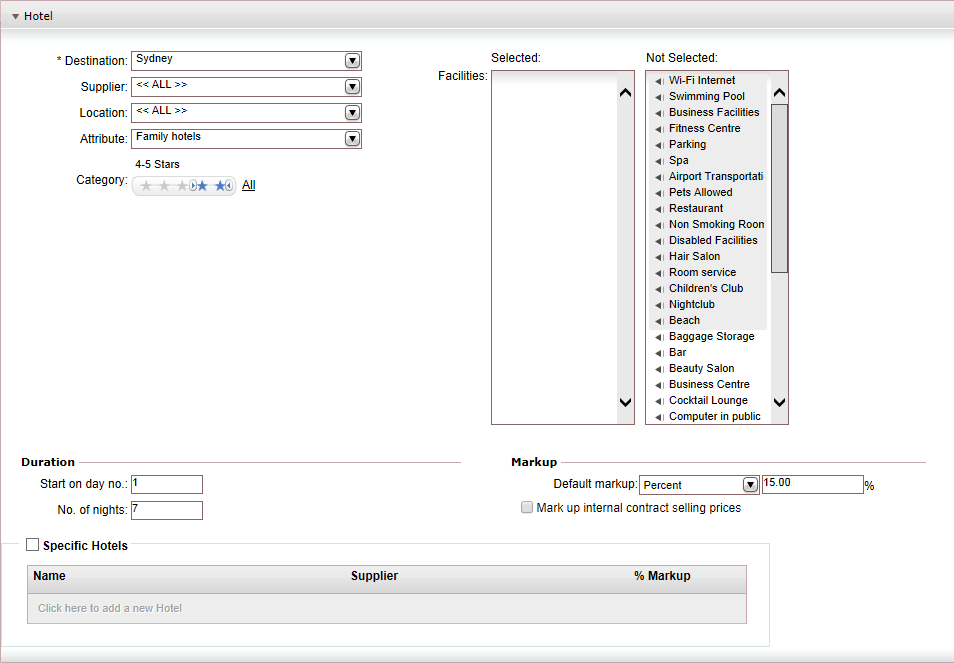
The bundling wizard is used for creating bundled packages comprised of components from multiple sources (internal contracts, online interfaces, and GDS) that are sold through the Reservations System.
Bundled packages serve two primary purposes, which correspond to the two types of packages that can be created:
Leveraging distressed flights: A Standard bundled package (flights and hotels), or a Fly and Drive bundled package (flights and car rentals) can be used towards leveraging distressed flights. You can define the parameters for which flights are included in the bundled package, or even define which specific flight numbers to include. This allows you to leverage distressed flights by making them more attractive as part of the package.
Event: An Event-led bundled package which is comprised of an activity, hotels, and (optional) flights is built around specific events (such as a football match, rock concert, etc.). The main attraction is the event, which is combined with existing flights and hotels sold through your website.


In an event-led bundled package, the event component is comprised of an activity contract that is built for that event. Only one activity contract can be included in the bundled package. However, you can include multiple price levels from the same package.
You can define that the flights displayed in the reservations system are determined according to the event dates. If this option is enabled, the event dates determine which flight dates are included in the package. If this option is not enabled, all available flights are included.
Because the activity contract is built for the event-led package, the prices are taken from the regular price list. A separate rate is not required, and therefore the package rate is not included in the bundled package.
The cost of the activity is included in the bundled package, and not added on top of it.
For flights, you are required to define the Destination. You have the option of defining an origin, airline, and cabin class.
Packages without an origin and airline allow you to build a package around specific events, which customers can reserve from any location around the world using any available airline.
With event-led, bundled packages, you can choose to remove the flight component, allowing you to create a package that is only comprised of hotels and activities.
With flights you can choose between the following options:



When adding specific flights to the bundled package, you need to specify for each inbound and outbound flight, the departure date, flight number, and classes (up to five classes). These flights are then displayed in a Flight Matrix. By default all possible combinations are selected, and if required specific pairs can be removed.
You also have the option of defining a minimum number of days between inbound and outbound flights.

In the image above, the minimum amount of days is 10. Therefore, the combinations of April 1 and April 8 are not selected because there are only seven days in between the flights. |
In addition, flight definitions for packages can include classes (for the General Flights, defining classes is optional, while for the Specific Flights, it is mandatory).
The default markup is applied to each flight combination, this percentage can be edited as necessary.

When deciding which hotels to display in the Reservations System, you can choose between defining general parameters for displaying hotels or defining which specific hotels to include in the bundled package.
Regardless, you are required to select a destination for the hotel, which should be the same destination as the bundled package.
The parameters that can be defined, include supplier, location, service attribute, category and facilities.
When adding hotels, you need to define which day of the package is the check-in day, (which is especially relevant for packages where the departure flight takes off and lands on separate days), and the duration of the hotel stay.
You need to apply a default markup to the hotels in the bundled package. If you are choosing to add specific hotels to the package, you can edit the markup percentage of each individual hotel. If you do not enter anything in the %markup field for a specific hotel, the markup applied is the default markup.

When choosing which cars to display in the Reservations System for Fly and Drive bundled packages, you need to define the car rental destination and general parameters that determine which car rentals are included in the bundled package.
The parameters that can be defined, include supplier, class, car type, transmission type, doors and air conditioning.
You can apply a default markup to all car rentals sold through the bundled package.
As was mentioned previously, the pricing of bundled packages is based on markup. The selling price of bundled packages is the cost price of each component + the markup percentages you choose to apply.
Separate markup percentages are applied to the flight and hotel/car components. If you are adding specific flights or specific hotels to the bundled package, you can edit the markup percentage that is applied to each individual flight and hotel.
With event-led packages, the event component is included in the selling price of the package, and not added on top of it.
Bundled packages can be sold on B2E, B2B, and B2C websites.
With external B2C websites, you need to create a widget for each individual bundled package you are selling using the widget generator. This widget is pasted into the HTML code of an external webpage (such as a landing page). The widget redirects from the external web page query to the B2C results page.
With B2E and B2B websites, In the Reservations System, the bundled package is sold as a Special Offer. In the administration tools, in the website definitions, you need to enable the Special Offer service to be a displayed. This is a one-time action.